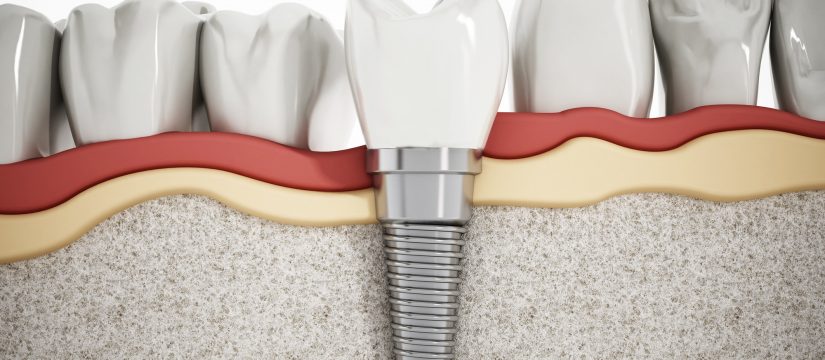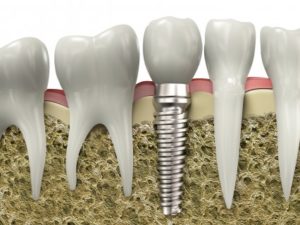
Are you considering dental implants to restore your smile and improve your oral health? If so, you might be wondering, “how long does a dental implant procedure take?” In this blog post, we will break down the dental implant process step by step and discuss the factors that can affect the duration of the procedure. Get ready to embark on a journey to a healthier, more confident smile.
Key Takeaways
- Dental implant process involves multiple steps and can take anywhere from a few months to over a year.
- Good oral hygiene, selecting an experienced dentist, and proper aftercare are essential for successful dental implants with long-term success rates.
- Choosing an experienced implant dentist and following post procedure care instructions ensure a smooth dental implant experience.
Understanding the Dental Implant Process
Dental implants are a popular and effective solution to replace missing teeth and improve overall oral health. The dental implant process involves multiple steps, including:
- Initial consultation and assessment
- Pre-implant procedures (such as bone grafting or tooth extraction, if necessary)
- Implant placement
- Healing and osseointegration (the process of the implant fusing with the jawbone)
- Placement of the abutment (a connector piece that attaches the implant to the replacement tooth)
- Placement of the dental crown or prosthetic tooth
The process will take anywhere between a few months to up to a year, depending on the patient’s specific needs and circumstances.
During the initial consultation, the dentist assesses the patient’s eligibility for dental implants by examining their oral health and discussing their treatment goals. Pre-implant procedures, such as tooth extraction or bone grafting, may be required to prepare the jaw for implant placement. The implant procedure involves the surgical insertion of a titanium post into the jawbone, which will eventually support the dental crown.
The healing period after the implant placement varies, allowing time for osseointegration – the fusion of the implant with the surrounding bone.
Initial Consultation and Assessment
The dental implant journey begins with an initial consultation, where the dentist performs a comprehensive exam to evaluate the patient’s oral health and suitability for the procedure. For those considering dental implants Rockville MD, this initial step ensures that the treatment plan is tailored to their specific needs. This appointment includes:
- A thorough examination of the patient’s teeth, gums, and jawbone
- A discussion of their medical history and treatment goals
- Advanced imaging techniques, such as 3D imaging and impressions, may also be used to create a personalized treatment plan tailored to the patient’s unique needs.
During the dental implant consultation, the dentist will determine if the patient is a good candidate for dental implants and if any additional procedures, such as tooth extraction or bone grafting, are necessary before the implant surgery. The initial consultation sets the stage for a successful dental implant treatment by establishing a clear understanding of the patient’s needs and expectations.
Pre-Implant Procedures
In some cases, patients may require pre-implant procedures to prepare their jaw bone for dental implant placement. These procedures can include tooth extraction, bone grafting, or sinus augmentation, and the healing time for these procedures can range from 3-6 months.
Tooth extractions may be necessary if the patient has damaged or decayed teeth that need to be removed before the implant placement. Bone grafting is performed when there is insufficient bone structure to support the implant, while sinus augmentation is required when the sinus cavity is too close to the implant site.
Timely replacement of missing teeth with dental implants can prevent bone loss and eliminate the need for bone grafting procedures.
Implant Placement and Healing
Implant placement is the surgical procedure during which the titanium implant post is inserted into the jawbone. This implant placement stage typically takes 10-30 minutes per implant, depending on the number of implants being placed and any additional tooth extractions required. The surgeon’s experience and technique, as well as the patient’s oral health, can influence the overall procedure time.
Following the implant placement, a healing period of 2-6 months is required for osseointegration to occur. During this time, the implant fuses with the surrounding bone, creating a strong foundation for the dental crown. The patient may be fitted with a temporary tooth or a healing cap to protect the implant site during this period.
Proper oral hygiene and a soft food diet are recommended to promote healing and ensure the success of the implant.
Factors Affecting Dental Implant Procedure Time
Several factors can influence the duration of the dental implant procedure, including the patient’s oral health, the type and number of implants, and the surgeon’s experience and technique. A patient with good oral health and an experienced surgeon may have a shorter procedure time compared to those with poor oral health and a less experienced surgeon.
Keep in mind that each patient’s dental implant journey is unique, and the duration of the process can differ based on individual needs and circumstances. These factors will help patients estimate the time needed to complete the dental implant process and achieve their desired results.
Patient’s Oral Health
A patient’s oral health can significantly impact the duration of the dental implant process. Factors such as gum and bone condition can determine the complexity of the procedure, and patients with poor oral health may require additional treatments before the implant placement, leading to a longer overall process.
Conversely, patients with good oral health may have a shorter recovery time and fewer complications during the procedure. Maintaining good oral hygiene and visiting the dentist regularly for checkups can help improve oral health and potentially reduce the duration of the dental implant process.
Type and Number of Implants
The type and number of implants being placed can also affect the overall procedure time. More complex implant types may require a longer procedure, while a greater number of implants can also increase the duration of the surgery.
For instance, immediate implants, which are placed immediately after tooth extraction, can shorten the overall treatment time, as they eliminate the need for a separate extraction appointment. However, not all patients are suitable candidates for immediate implants, and the dentist will determine the best treatment approach based on the patient’s specific needs and circumstances.
Surgeon’s Experience and Technique
The surgeon’s experience and technique can have a significant impact on the efficiency and success of the dental implant procedure. An experienced surgeon may be able to complete the procedure in a shorter duration than a less experienced surgeon, leading to a more streamlined treatment process.
Additionally, a skilled surgeon will be better equipped to handle any complications that may arise during the procedure, reducing the risk of implant failure and ensuring a successful outcome. Choosing an implant dentist with a high level of expertise and experience in the field is key to achieving the best possible results.
Post-Implant Recovery and Final Restoration
After the dental implant placement and healing period, the final step in the dental implant process is the post-implant recovery and final restoration. This stage involves managing recovery expectations and placing the abutment and dental crown to complete the tooth replacement.
During the recovery period, patients may experience swelling, bruising, and discomfort, which typically subside within a few days to a week. Following the dentist’s instructions for post-procedure care and maintenance, which include proper oral hygiene and regular dental checkups, is vital for the longevity and success of the dental implant.
Recovery Expectations
Recovery expectations for dental implants can vary depending on the individual and the specific procedure. Generally, it takes approximately 1-2 days to recover from the surgical procedure. However, the healing and recovery period for dental implants typically requires a timeframe of 2-6 months or longer for osseointegration to occur.
During this time, patients should expect some swelling, bruising, and pain, which can be managed with over-the-counter pain relievers and ice packs. Following the dentist’s instructions for post-procedure care, such as maintaining proper oral hygiene and avoiding hard and sticky foods, can help ensure a smooth recovery.
Abutment and Crown Placement
Once the healing period is complete and osseointegration has occurred, the final step in the dental implant process is the placement of the abutment and dental crown. The abutment is the component that connects the dental implant to the crown, while the crown serves as the visible, functional part of the tooth.
The abutment and crown placement typically occurs in a single appointment, approximately 1-2 weeks after the healing period. The dentist will attach the abutment to the dental implant and then secure the custom-made dental crown to the abutment.
This final step completes the dental implant process, resulting in a fully functional and aesthetically pleasing tooth restoration.
Benefits of Dental Implants and Their Longevity
Dental implants offer numerous benefits over other tooth replacement options, including:
- Improved functionality and aesthetics
- Better chewing ability
- Clearer speech
- More natural-looking appearance
- High long-term success rate, often lasting for decades with proper care and maintenance.
Maintaining good oral hygiene and scheduling regular dentist checkups are vital in ensuring the longevity of dental implants. By taking the necessary steps to care for dental implants, patients can enjoy the advantages of this innovative tooth replacement solution for many years to come.
Improved Functionality and Aesthetics
Dental implants provide a significant improvement in functionality and aesthetics compared to other tooth replacement options, such as dentures or bridges. The titanium implant post securely anchors the dental crown to the jawbone, allowing for better chewing ability and a more stable tooth replacement.
In addition to improved function, dental implants offer a more natural-looking appearance. The dental crown is custom-made to match the patient’s existing teeth in size, shape, and color, blending seamlessly with the surrounding teeth. This results in a more attractive and confident smile, improving the patient’s overall quality of life.
Long-Term Success Rates
One of the most significant advantages of dental implants is their high long-term success rate. With proper care and maintenance, dental implants can last for decades, providing a durable and reliable tooth replacement solution.
Factors that can influence the longevity of dental implants include the patient’s oral health, the type and number of implants, and the surgeon’s experience and technique. By selecting an experienced implant dentist and adhering to proper aftercare and maintenance, patients can maximize the success and longevity of their dental implants, ensuring a lifetime of healthy smiles.
Tips for a Smooth Dental Implant Experience
For a smooth dental implant experience, choosing an experienced implant dentist and practicing proper aftercare and maintenance is important. Choosing a dentist who specializes in dental implants and has a proven track record of success can help minimize complications and increase the likelihood of a successful outcome.
Along with choosing an experienced implant dentist, adhering to the dentist’s instructions for post-procedure care and maintenance is vital. This includes maintaining good oral hygiene, avoiding hard and sticky foods, and visiting the dentist regularly for checkups.
By adhering to these guidelines, patients can enjoy a successful dental implant experience and a lifetime of healthy, beautiful smiles.
Selecting an Experienced Implant Dentist
Selecting an implant dentist should involve careful consideration of their experience and expertise in the field of dental implants. Look for a dentist who is a member of the American Academy of Implant Dentistry (AAID) and has demonstrated proficiency in placing and restoring dental implants.
In addition to evaluating the dentist’s credentials, inquire about their experience with dental implants, the number of dental implant procedures they have performed, and the type of training they have received. Reading online reviews and ratings can also provide insight into the dentist’s reputation and the quality of their work.
By selecting an experienced implant dentist, patients can increase their chances of a successful dental implant experience and get dental implants with confidence.
Proper Aftercare and Maintenance
The longevity and success of dental implants heavily depend on proper aftercare and maintenance. This includes brushing and flossing regularly, using an antiseptic mouthwash, and visiting the dentist for regular checkups. Maintaining good oral hygiene can help prevent the buildup of plaque and bacteria, which can lead to infection and other complications.
In addition to maintaining good oral hygiene, it is important to avoid smoking and excessive alcohol consumption, as these habits can negatively impact the healing process and the long-term success of dental implants. By adhering to these guidelines, patients can ensure the health and longevity of their dental implants, enjoying the benefits of a restored smile for years to come.
Summary
In conclusion, the dental implant process involves multiple steps, from initial consultation to final restoration, and the duration of the procedure can vary depending on various factors. By selecting an experienced implant dentist and following proper aftercare guidelines, patients can enjoy a smooth dental implant experience and a lifetime of healthy, functional smiles. With improved functionality, aesthetics, and high long-term success rates, dental implants are a worthwhile investment for those seeking a durable and reliable tooth replacement solution.
Frequently Asked Questions
How long do dental implants take from start to finish?
Getting a dental implant from start to finish typically takes two to six months. However, if an extraction or bone graft is required beforehand or complications occur, the process may take longer.
How painful is getting one dental implant?
Getting a dental implant is generally painless, with only pressure felt during the procedure. Patients may experience some discomfort and swelling for up to 10 days afterward, but pain can be managed with over-the-counter medications.
Do they put you to sleep for dental implants?
For dental implants, patients are usually given conscious sedation to ease discomfort and ensure a successful procedure. Local anesthesia is also applied to the area of the mouth being worked on.
What are the 3 stages of dental implants?
The three stages of dental implant procedures are placing the implant into the jawbone, adding the abutment to the implant, and connecting the artificial tooth onto the abutment.
How long does the healing period after implant placement take?
On average, it takes around 2-4 months for osseointegration to occur after implant placement.








